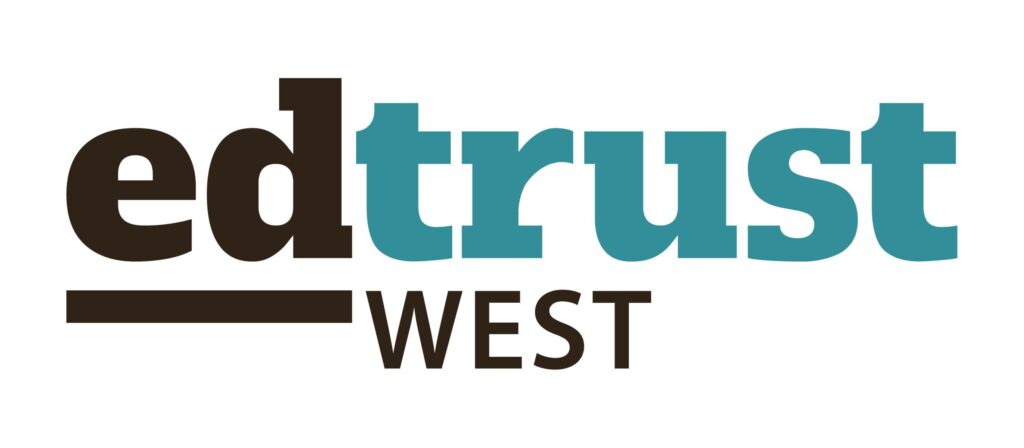When the COVID-19 pandemic shuttered school buildings and campuses across the state and nation in March 2020, The EdTrust–West (ETW) turned to our educator community to hear their perspectives. We held four listening sessions with educators across the state to ensure their voices are prioritized through the ongoing pandemic. We also worked closely with ETW’s Educator Advisory Council (EAC) to gather invaluable insights from California’s classrooms and inform our policy and legislative positions.
For Teacher Appreciation Week this year, we’re amplifying educator voices to help ensure they are seen, heard, and reflected in policy decisions.  Pandemic recovery will require bold, innovative solutions, and we firmly believe those decisions should be driven by the voices of educators, parents, and students. Below, we share the themes and policy solutions we heard directly from educators, as well as takeaways from EAC members. We hope policymakers keep these perspectives front and center as we all look toward restarting in-person learning.
Pandemic recovery will require bold, innovative solutions, and we firmly believe those decisions should be driven by the voices of educators, parents, and students. Below, we share the themes and policy solutions we heard directly from educators, as well as takeaways from EAC members. We hope policymakers keep these perspectives front and center as we all look toward restarting in-person learning.
1. Educators believe that professional development on student mental health, trauma-responsive social-emotional learning, and institutionalized racism and bias should be top priority for the 2021-22 school year. We know from polling parents that students are experiencing heightened level of stress – 67% of parents said their child’s stress level was higher than usual. School should be a safe and supportive place for students, yet anti-Black and anti-Asian racism remains prevalent as state-sanctioned violence and hate crimes persist. We also know that implicit biases held by teachers against students of color play a deep-seated role in perpetuating inequities in academic and social–emotional outcomes. If left unaddressed, students in need of additional support will be returning to classroom settings where those biases will continue.
In order to combat these challenges, we urge state policymakers to stand with teachers and…
- Institute a day of healing as a first step to establishing safe and supportive learning environments and memorialize loss as a result of the pandemic and racialized violence. Prioritize an anti-racist intersectional frame in all conversations centered on healing.
- Require that a portion of state and federal coronavirus recovery funds be used by districts and schools to support student and adult mental health and social emotional wellness.
2. Educators made it clear that their abilities to rebuild schools and classrooms rely heavily on prioritizing their own mental health and well-being. Our educators have taken on an immense amount of stress over the past year. One poll found that more than half of teachers (57%) reported working more hours per week during this school year than they did before the pandemic. Most teachers (81%) also reported that teaching had become more stressful over the past year. It’s crit ical that we honor the incredible work that teachers have shouldered over the last year by prioritizing their health and wellness.
ical that we honor the incredible work that teachers have shouldered over the last year by prioritizing their health and wellness.
In order to honor teachers, we urge state policymakers to…
- ○Require that districts detail how they will be providing mental health supports to educators in their 2021-22 LCAPs under Priority 1.
- ○Require that districts work with community-based organizations and mental health providers to offer direct mental health services to students, families, and educators who do not have access to these services outside of school. Prioritize meeting the mental health needs of those who are Black, Indigenous, and people of color (BIPOC).
3. Educators have appreciated having parents as partners in student learning and want to be sure that students, parents, and educators all continue to play a role in informing school and district decision-making.
 The shift to distance learning completely upended the way that parents interacted with teachers and their children’s learning. Now, parents want to stay connected – our poll found that 93% of parents (94% of parents of color) said it would be helpful if schools stayed in regular contact with families to ensure students and parents remain connected to the school community. Perhaps most importantly, it would benefit students: research has shown that parent engagement is key to student academic success and persistence.
The shift to distance learning completely upended the way that parents interacted with teachers and their children’s learning. Now, parents want to stay connected – our poll found that 93% of parents (94% of parents of color) said it would be helpful if schools stayed in regular contact with families to ensure students and parents remain connected to the school community. Perhaps most importantly, it would benefit students: research has shown that parent engagement is key to student academic success and persistence.
In order to build off the important trend we’ve seen in collective decision-making, state policymakers should…
- Reimagine the role that existing parent advisory groups (English Learner Advisory Councils and School Site Councils) play in school decision-making. Consider appointing community liaison roles to those committees to continue actively engaging parents in the learning process.
- Require that districts establish regular multilingual check-ins with families to understand their needs, ensure they are informed about recent school and district developments, and gather input and perspectives on critical school and district decisions.

4. Educators also made it clear that when it comes to being appreciated and valued, there needs to be more financial support, particularly for educators of color. The early learning workforce, predominantly women of color, has been especially hard hit during the pandemic. Strikingly, the poverty rate for early educators in California was already 17%, much higher than for California workers in general (8.7%), even before a wave of early learning program closures hit the sector. Those closures are anticipated to continue, posing the chilling possibility of further economic devastation for early educators.
Financial support is also needed for K-12 educators of color. We know from research that educators of color face greater financial barriers to entering and remaining in the profession. California’s teaching workforce is significantly less diverse than the K-12 student population, while research shows all students benefit from having teachers of color.
To sustain the teacher workforce, it is imperative that state policymakers…
- For early educators, invest in increasing reimbursement rates by supporting SB 246 (Leyva), which would create a streamlined reimbursement system for childcare providers and increase current rates to better reflect the true cost of care.
- Continue to invest in grant programs like the Golden State Teacher Grant Program and Teacher Residency Grant Program and consider expansions to programs that work to recruit and retain educators of color, like AB 520.

Recognizing California’s tireless teachers is important, and equally important is showing appreciation with supportive action. There is a long road ahead to recover from the health and education crisis we have endured for over a year. To recover effectively, we must center and show authentic care for our educators: the very people who have committed to not only sustaining California’s education systems, but teaching and supporting our state’s future leaders.
Abby Ridley-Kerr is the Senior Research & Data Analyst at the EdTrust–West. She leads ETW’s educator diversity work and contributes to work that advances research and policies that work to expand pipelines for educators of color across the state of California. She also leads ETW’s work on the digital divide to ensure that no student faces digital equity barriers to learning. Abby earned her Master’s degree in public policy from UC Berkeley’s Goldman School of Public Policy and her B.A in Political Science with honors from Boston University.
Jana Luft is the Senior Educator Engagement Associate at the EdTrust–West. She supports ETW’s engagements with California school districts and county offices of education. She also supports ETW’s research and advocacy for equitable early learning policies and practices, diverse and effective educators, and the cradle-to-career data system. She received a Bachelor of Arts in sociology from Wesleyan University and a Masters of Arts in learning and instruction from the University of San Francisco.


